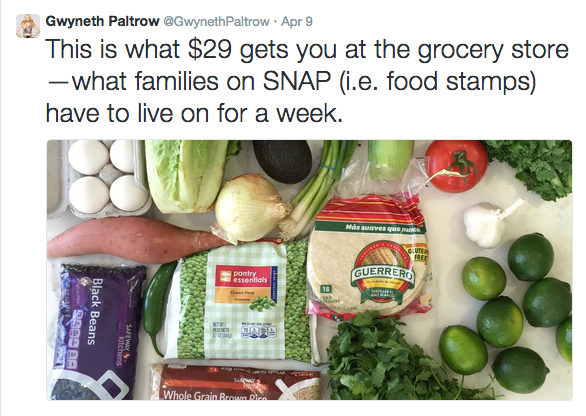In case you’ve been living under a rock or been on a social media fast for the past week, you’re probably aware that actress/lifestyle guru Gwyneth Paltrow tried, and failed, to feed herself for a week on $29—the amount she would get if she was on Supplemental Nutrition Assistance Program aka SNAP or what is commonly called “food stamps”.
Paltrow didn’t last long—only four days—but even before she threw in the towel, there was a lot of criticism over her food choices which she shared on Twitter. Critics sneered that most poor people don’t buy limes and avocados. There was also concern that her choices left her in danger of consuming under 1,000 calories a day for an entire week (considering that she is a 42 year old self-confessed fitness junkie, Paltrow should consume around 2,200 calories a day).
Still, there was an even bigger problem with her choices which is that her choices are too healthy. Simple put, poor people do not consume nearly as much fresh produce as she Tweeted.
While some of this has to do with access (many low-income people live in “food deserts” and may have limited transportation) a lot of it has to do with the reality of living poor. I know a little bit about this having grown up poor myself.
When my mother divorced my father and suddenly found herself as an unemployed single parent living in Eastern North Carolina we weren’t lower-middle class, lower-class or working-class, we were freaking poor. Meals consisted mainly of pasta, peanut butter, and canned pasta sauce. When we had vegetables, they were overwhelmingly from a can or frozen. While some frozen vegetables can be healthier than their fresh counterparts and in some cases, even taste better, we weren’t eating those kind of frozen foods. In addition to being cheap, these foods were also quick and easy to prepare which is a must for many low-income people who have kids and work multiple jobs and/or cannot be there with their kids during meal time much less take the time to prepare a proper meal for themselves.
While I cannot remember even going to bed hungry, I was always aware that money was tight and food was scarce. It was a feeling that lasted even after my grandmother stepped in and provided us with all the food we ever needed (it wasn’t until we lived with her that I discovered what fresh broccoli looked like and it wasn’t naturally limp and brown). Compared to how I shop and prepare food today, the diet of my childhood was pretty bleak even after there was enough money to have more choices.
I thought of this as I read the coverage of Paltrow’s failed challenge. Anyone who has ever perused her blog or read an interview or two of hers knows that Ms. Paltrow is an easy target. While it is true that she come across as out of touch on several things, her ignorance of what it really means to be poor is hardly unique—any middle class and upper class people in the mind/body community I know are equally unaware. A friend of mine, who happens to be a yoga instructor in her spare time and works for an non-profit that reaches out to low-income children and teaches them how to cook, expressed that one of the biggest challenges she and others faced was coming up with food that her kids would actually eat and prepare themselves.
As Max Ehrenfreund reports in The Washington Post, “if the children won’t eat what the parents have cooked, the wasted food amounts to a major financial loss.” He also notes that most Americans—regardless of income—don’t eat that well to begin with. The problem on how to eat well especially on a limited budget is all the more complex and cannot be easily solved.
Therefore, while it’s easy to snark on Paltrow, it would be more constructive to sit back and look at the various factors as to why most disadvantaged people eat so poorly. Plus, no matter what one might think of her love of various luxury goods, she does deserve credit for trying and for raising awareness of The Food Bank for New York City which kicked off the challenge.
As she wrote on her blog:
“I know hunger doesn’t always touch us all directly—but it does touch us all indirectly. After this week, I am even more grateful that I am able to provide high-quality food for my kids. Let’s all do what we can to make this a basic human right and not a privilege.”
Not only is she right but hopefully, all of us can see and stand behind that.
~
Relephant:
“I work for the food stamp program—it’s heartbreaking—and appalling—what is being done.”
~
Author: Kimberly Lo
Editor: Katarina Tavčar
Photo: Twitter screenshot



Read 1 comment and reply